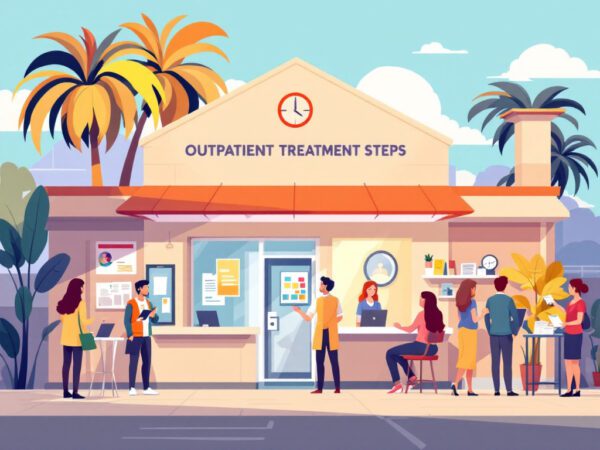Understanding Outpatient Mental Health Treatment
Outpatient mental health treatment plays a significant role in supporting individuals facing various challenges, such as addiction and emotional disorders. At Totality Treatment, we specialize in providing comprehensive outpatient services, allowing individuals to receive necessary care while still fulfilling daily responsibilities.
Benefits of Outpatient Care
Outpatient mental health treatment offers several advantages, making it an appealing option for many individuals:
- Flexibility: Clients can attend therapy sessions while maintaining work, school, or family commitments.
- Cost-Effective: Outpatient care is typically less expensive than inpatient treatment and is often covered by insurance.
- Tailored Support: Services can be customized to meet individual needs, focusing on specific issues and goals.
- Variety of Treatment Options: Outpatient care includes various programs, including intensive outpatient programs and partial hospitalization programs.
| Benefits of Outpatient Care | Description |
|---|---|
| Flexibility | Maintain daily activities while receiving treatment |
| Cost-Effective | Typically less expensive than inpatient care |
| Tailored Support | Customized treatment to meet individual needs |
| Variety of Programs | Options like IOPs and PHPs available |
Types of Outpatient Programs
Different types of outpatient programs serve various needs, ensuring that individuals receive appropriate care:
-
Intensive Outpatient Programs (IOPs): These programs provide structured treatment that involves therapy sessions several days a week, lasting multiple hours. IOPs include various activities such as art therapy or yoga to enhance recovery (Ascend Behavioral Health). This option is best for those needing more support than traditional therapy without hospitalization.
-
Partial Hospitalization Programs (PHPs): PHPs deliver intensive and structured therapy with daily treatment sessions, followed by the ability to return home or to a sober living community. This arrangement provides therapy, group counseling, and skill-building to help manage symptoms.
-
Traditional Outpatient Programs: These include regular counseling sessions and therapy focused on various mental health issues, like substance use disorders, depression, and anxiety.
-
Individualized Intensive Programs (IIPs): These are designed to provide personalized care based upon the unique needs and circumstances of each client.
Outpatient mental health services can effectively support recovery and provide assistance for those facing the challenges of addiction or other mental health issues. For more information on our specific programs, including outpatient addiction treatment and case management addiction, we invite you to explore our offerings at Totality Treatment.
Totality Treatment Programs Overview
At Totality Treatment, we prioritize comprehensive care through our specialized detox and rehab programs designed to support individuals battling drug and alcohol addiction. Both approaches aim to guide clients toward recovery in a structured and supportive environment.
Detox Programs
Our detox programs provide essential medical supervision for individuals looking to safely withdraw from drugs or alcohol. During this critical phase, clients receive personalized care to manage withdrawal symptoms effectively. We understand the complexities of detoxification and offer tailored treatment plans aimed at ensuring comfort and safety.
| Detox Program Feature | Description |
|---|---|
| Medical Supervision | Continuous monitoring by qualified professionals to manage withdrawal symptoms and ensure safety. |
| Personalized Care | Customized treatment plans based on individual needs and medical history. |
| Supportive Environment | A compassionate atmosphere where individuals can focus on recovery without distractions. |
We offer specialized options like alcohol detox placement and drug detox placement, ensuring that clients receive the most appropriate care for their specific situations. For those facing unique challenges, including fentanyl or benzodiazepine dependence, we provide targeted solutions such as fentanyl detox placement and benzo detox placement.
Rehab Programs
Following detox, our rehab programs offer a continuum of care essential for long-term recovery. We offer various options, including intensive outpatient programs and partial hospitalization programs. Each program is designed to help individuals work through the underlying issues of addiction while equipping them with coping strategies for the future.
| Rehab Program Feature | Description |
|---|---|
| Therapeutic Sessions | Regular individual and group therapy sessions focused on recovery and self-discovery. |
| Holistic Approaches | Incorporating various therapeutic techniques such as EMDR therapy and on-site TMS therapy to address dual diagnoses and co-occurring disorders. |
| Aftercare Support | Ongoing support to facilitate a smooth transition back into daily life, including resources for employment training support and housing referral outpatient. |
Through these rehab programs, we work diligently to help our clients build resilience against potential relapse and navigate their path to sustained recovery. Each step is carefully outlined in a personalized treatment plan that evolves as clients progress through their recovery journey.
Choosing Totality Treatment for detox and rehab programs means gaining access to professional psychiatric support outpatient, holistic therapies, and a nurturing environment dedicated to lasting recovery.
Totality Treatment’s Approach to Mental Health
At Totality Treatment, we understand that each person’s journey to recovery is unique. That’s why we focus on developing a tailored approach to mental health that meets the specific needs of each individual. Our methods support those seeking drug and alcohol treatment through effective psychiatric support outpatient programs.
Personalized Treatment Plans
We pride ourselves on creating Individualized Treatment Plans (ITPs) for our clients receiving psychiatric support outpatient services. These plans are collaboratively developed between the client and our service providers. This process begins with a diagnostic assessment, which helps us to better understand the client’s symptoms, family history, and personal priorities. This allows us to identify appropriate interventions and services that reflect the individual’s diagnosis and related needs (Ohio Administrative Code).
To ensure that treatment remains relevant and effective, we review and update the treatment plan at least every ninety days. Adjustments are made sooner if clinically indicated to ensure continuous support. Our focus on personalization aids in achieving better outcomes for our clients.
Therapeutic Techniques
Our therapeutic techniques are grounded in evidence-based, trauma-informed care. We emphasize a holistic approach that includes various modalities tailored to the individuals we serve. Our team employs psychotherapy, medication management, and interventional psychiatry, catering to the diverse needs of our clients journeying through recovery.
We also recognize the importance of ongoing care after completing treatment. This engagement helps maintain progress, promotes long-term wellness, and reduces the risk of relapse. Our structure ensures regular mental health check-ins, refinement of coping skills, and necessary adjustments to treatment plans, which are crucial for sustained success.
In essence, our approach at Totality Treatment is not just about addressing addiction, but about supporting overall mental health. By combining personalized plans with innovative therapeutic techniques, we aim to provide the best possible environment for recovery. We invite you to learn more about our outpatient addiction treatment options and see how we can help you or a loved one on the path to healing.
Comprehensive Services at Totality Treatment
At Totality Treatment, we prioritize providing comprehensive mental health services tailored to meet the needs of each individual. Our approach begins with thorough evaluations and extends to detailed treatment plan development.
Psychiatric Evaluation Process
The psychiatric evaluation process serves as the foundation for personalized treatment. During the initial outpatient evaluation, our team aims to identify a diagnosis by exploring various factors related to the individual. This process involves examining current symptoms, family history, medical conditions, daily life, and personal priorities.
The evaluation includes a comprehensive assessment, which typically encompasses:
- Complete medical and psychiatric history
- Mental status exam
- Tentative diagnosis
- Assessment of the individual’s ability to participate in treatment
This integrated diagnostic evaluation is essential for individuals experiencing psychiatric illness, emotional, or behavioral symptoms that significantly impact their personal or social functioning (CMS).
| Evaluation Component | Description |
|---|---|
| Medical History | Review of past medical issues and treatments |
| Psychiatric History | Overview of previous mental health diagnoses and treatments |
| Mental Status Exam | Assessment of cognitive functions, mood, and thought processes |
| Tentative Diagnosis | Initial identification of potential mental health conditions |
Treatment Plan Development
Following the psychiatric evaluation, we work collaboratively to develop a detailed treatment plan tailored to each individual’s needs. Each plan includes a specific outline of required mental health or addiction services, treatment goals, and objectives. According to the Ohio Administrative Code, the treatment plan must cover essential components including:
- Description of services and support needs
- Anticipated treatment goals and objectives
- Frequency of treatment services and participation of the client in the planning process
Plans are reviewed and updated at least every ninety days to ensure they remain effective and aligned with the individual’s progress. This ongoing assessment allows for any necessary adjustments to be made promptly and appropriately.
For more information on our various services, including outpatient addiction treatment options and specialized programs like our individualized intensive program, feel free to explore further. We believe that effective treatment starts with understanding and continues with personalized care and ongoing support.
Choosing Between Inpatient and Outpatient Care
Making the right choice between inpatient and outpatient care is crucial for anyone facing drug or alcohol addiction. We understand that this decision can be influenced by various factors.
Factors Affecting Treatment Options
Several factors play a significant role in determining whether outpatient or inpatient treatment is the best fit. Key considerations include:
- Severity of Symptoms: Individuals with severe symptoms may benefit more from the structure and support of inpatient care.
- Safety Concerns: If there are risks to personal safety, inpatient treatment may be necessary to provide a secure environment.
- Functional Impairment: Those who face difficulties in daily functioning might require more intensive support, making inpatient care advantageous.
- Treatment History: Previous experiences with treatment can help guide decisions. Those who have relapsed may need a more intensive approach.
- Professional Guidance: Collaborating with mental health providers during a comprehensive assessment can lead to personalized recommendations for the most suitable treatment plan (Clear Behavioral Health).
Our approach at Totality Treatment allows individuals to thoroughly evaluate these factors, ensuring that they receive care tailored to their unique needs.
Importance of Ongoing Care
Ongoing care is essential after completing either inpatient or outpatient treatment. Engaging in continuous support helps sustain progress, prevent relapse, and promote long-term wellness. Some benefits of ongoing care include:
- Regular Mental Health Check-Ins: Maintaining contact with mental health professionals in regular intervals can help monitor emotional health and recovery progress.
- Proactive Measures: Continued engagement enables individuals to address any arising issues swiftly, reducing the likelihood of setbacks.
- Refinement of Coping Skills: Ongoing therapy sessions reinforce coping strategies learned during treatment, helping individuals deal with triggers in real life.
- Adjustment of Treatment Plans: Regular assessments allow for modifications to treatment plans as needs change, ensuring that care remains effective (Clear Behavioral Health).
Active participation in ongoing care fosters a strong support system, whether through outpatient services or community programs. Those seeking recovery can explore various options available at Totality Treatment, including outpatient addiction treatment programs tailored to individual needs.
Credentialing in Mental Health Care
Significance of Provider Credentialing
Provider credentialing in mental health care is a vital process for ensuring that practitioners meet the necessary legal and ethical standards. It serves multiple critical functions, including compliance with regulations, reimbursement eligibility, and the maintenance of quality care standards. Essentially, credentialing acts as a gatekeeper, establishing trust between patients and mental health providers while minimizing risks associated with inadequately trained professionals.
Credentialing is not merely a bureaucratic process; it directly impacts the quality of care that patients receive. By ensuring that providers have the required qualifications and certifications, treatment centers can deliver services that align with both legal and best practice standards. For those seeking comprehensive mental health services at organizations like Totality Treatment, understanding the significance of credentialing helps in building trust in the treatment process.
| Aspect | Importance |
|---|---|
| Compliance | Ensures practitioners meet legal and ethical standards. |
| Reimbursement | Necessary for insurance payments and coverage. |
| Quality Care | Supports the ongoing provision of high-quality services. |
| Trust | Establishes confidence between patients and treatment providers. |
Steps in the Credentialing Process
The process of individual provider credentialing involves several detailed steps that ensure comprehensive verification of qualifications and capabilities. While the timeline can vary significantly, credentialing can take weeks to months due to the thorough nature of verification required. Below are the typical steps involved in the credentialing process:
-
Obtain Required Identifications and Documents: Providers must gather all necessary documentation, including licensure and educational qualifications.
-
Complete a Central Profile: Many states require enrollment in a centralized system such as CAQH ProView, which facilitates the sharing of credentials with multiple organizations and payers.
-
Apply to Insurance Panels: Providers need to apply to various insurance panels or payer programs to receive reimbursement.
-
Undergo Primary Source Verification: This involves verifying the information provided through primary sources, such as educational institutions and licensing boards.
-
Credentialing Committee Review: A committee reviews the collected documentation to ensure compliance with established standards and practices.
-
Complete Contracting and Enrollment: After approval, providers must finalize their contracts with insurers and complete enrollment processes to be designated as in-network providers.
Understanding these steps can help individuals seeking mental health care appreciate the rigor that goes into vetting providers for quality and accountability. For those considering programs like outpatient addiction treatment or specialized services, knowing that their provider has undergone this process offers peace of mind as they begin their recovery journey.















